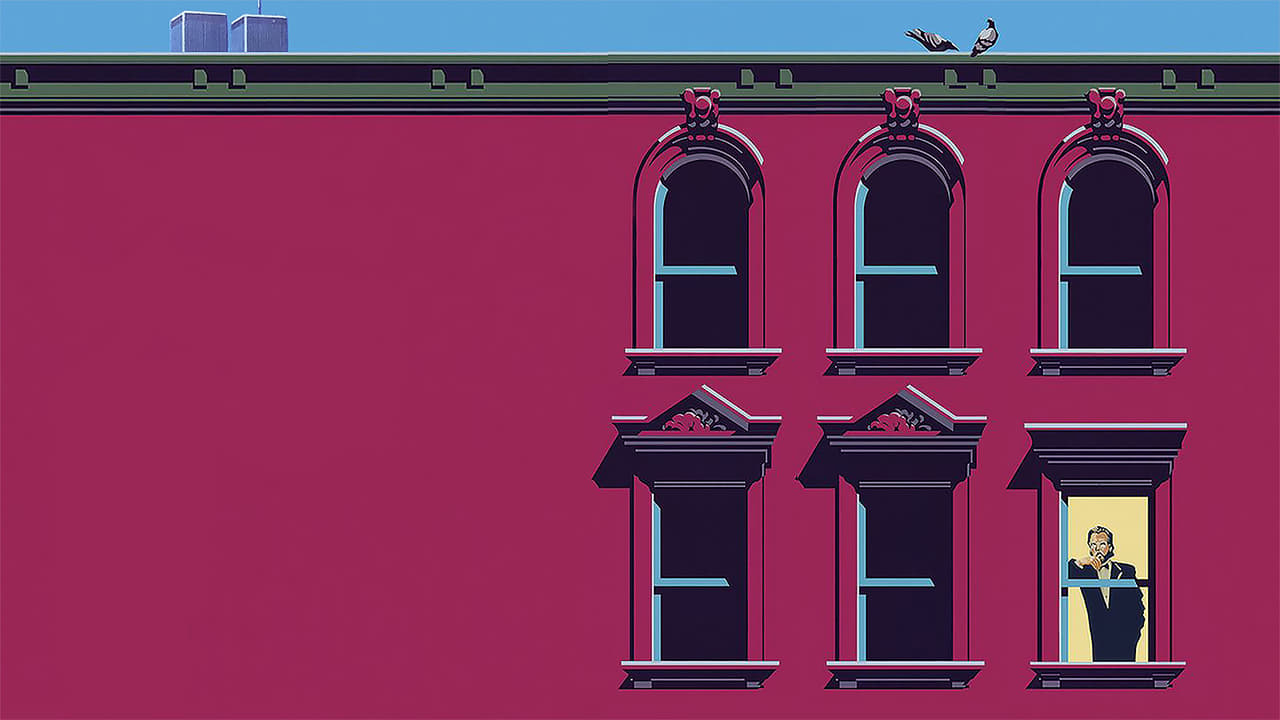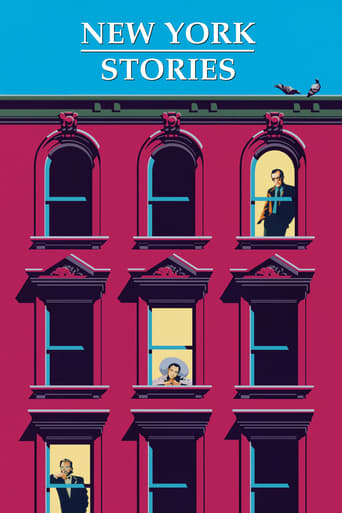

Lack of good storyline.
... View MoreAbsolutely brilliant
... View MoreFanciful, disturbing, and wildly original, it announces the arrival of a fresh, bold voice in American cinema.
... View MoreI enjoyed watching this film and would recommend other to give it a try , (as I am) but this movie, although enjoyable to watch due to the better than average acting fails to add anything new to its storyline that is all too familiar to these types of movies.
... View MoreI have viewed the "Life Lessons" segment of New York Stories probably 80 times. I use the film religiously in my college writing classes.The assignment I give my students is to define art for Lionel, for Paulette, and for themselves. After some analysis, students realize that a big problem between Lionel and Paulette is that they view art differently. Paulette constantly needs external validation ("Can you tell me if I'm any good or not") while for Lionel art is a compulsion - his life and art feed off each other. Students who are able to get past Lionel's somewhat dysfunctional personality are able to understand and discuss some very important concepts about what it is to be an artist.I would highly recommend "Life Lessons" to anyone teaching art, aesthetics, writing, or theater classes. It's a great way to initiate a discussion about art.
... View MoreIt's exciting to find three high profile filmmakers working in a short story format, but (perhaps not surprisingly) this unique anthology adds up to something less than the sum of its parts. Because of the talent involved it's difficult to avoid playing the comparison/contrast game, which would make Martin Scorsese's 'Life Lessons' the most impressive segment, in large part because of Nick Nolte's dynamic portrayal of a burned-out bohemian artist in trend-setting SoHo. Scorsese's direction is no more stylish than the efforts of his companions, but there's more substance in this one episode than in both others combined. Francis Ford Coppola's 'Life Without Zoë' is a fizzy, uptown urban fairy tale told from the point of view of a precocious, sophisticated 12-year old heiress, and Woody Allen's amusing, typically neurotic 'Oedipus Wrecks' is reminiscent of one of his New Yorker essays, perhaps better suited to the printed page. Taken altogether, the trilogy is a diverting throwaway effort by three directors whose talents far outshine the material each is working with.
... View MoreThree top directors (Martin Scorsese, Francis Ford Coppola, Woody Allen) helm three separate stories about denizens of the Big Apple. Scorsese, still in "After Hours" mode, works quite well with handsome, raffish Nick Nolte, playing an obsessive painter; Coppola, working from a dim script co-written with daughter Sofia, has nothing up his sleeve with a tale about a poor little rich girl; Allen wrote and co-stars with Mia Farrow in the best segment, a funny fantasy about a Jewish man at the mercy of his domineering mama. Snazzily-produced picture appears to have everything going for it in the talent department, but one is ultimately left undernourished by the final results. This project is rather obviously just a holding-pattern for the trio of filmmakers, and not enough heart makes it into the mix. ** from ****
... View MoreNew York Stories is another anthology film that I was suckered into because of the credentials. Other anthology films that I've seen, like Four Rooms, have not been very good despite the amazing credentials. I haven't been a fan of most movies with more than one director, hence more than one vision thus many colliding like an orchestra playing unharmonious notes. New York Stories is satisfactory however, eve if its mood swings leave one feeling many different ways about it. You'll feel stimulated, yet strangely unfulfilled.Martin Scorsese's segment, Life Lessons, is very melodramatic in that hardened, grungy way of his. Nolte gives a wonderful performance, very intense, and Arquette is very realistic and effective. Scorsese employs his usual machine gun multi-genre soundtrack and plunging, stylistically passionate and energetic cinematography. His segment says something very profound and important about the human characteristic of selfishness and how much more abundant it is in ourselves than we care to accept.Then comes Francis Ford Coppola's segment, Life Without Zoe. Arg. The acting, despite the leniency one may generously give child actors, is awful. Heather McComb did in fact fill out very very nicely when she grew up, but that does not excuse her very scripted performance here. She's the least of the cast's problems, though. Everyone sounds like the salesmen on the used car commercials. The story is something quite silly. Perhaps it would be fine if it were its own film, but Coppola had to know that he was being teamed with Scorsese, his fellow creator of quintessential Mafia cinema, and Woody Allen, the prolific source of mature and sophisticated comedies about sex and relationships. Did he submit this segment for shock value? I guess so. Well, it worked. I don't understand why Coppola works with kids. His daughter Sophia, who at age 18 here co-wrote the script and designed the costumes, did in fact go on to become a fine director herself, but did he not notice his pattern after awhile? He makes The Conversation, the Godfather films, and Apocalypse Now, and we think he's found his niche. Then he starts making movies like this, following up with films like Jack with Robin Williams.Woody Allen's segment saves the film. I suppose this is one way anthology movies are interesting. In a single feature-length narrative film, when it takes a plunge in the middle, it can't really be saved in the end, especially if it was as bad as Coppola's segment. In an anthology, if the middle of the movie is terrible, you still have the end to look forward to. This is the case in New York Stories, because Woody Allen's segment, Oedipus Wrecks, the final third of the movie, is hilarious. It's one of the funniest satires he's ever done of the Jewish Brooklynite's culture. It's goofy in a subtle way, and fascinatingly surreal the way a lot of Allen's best and most creative work is. Actually, Oedipus Wrecks is perhaps the only one of the three parts that actually clearly represents a hue of New York's culture. Scorsese's part didn't represent New York as much as it represented the emotional tempests of an artist and happened to take place in the meatpacking district. Coppola's mid-section represented the lives of wealthy children whose lives are so free that they live practically like very spoiled and gossipy adults, but to such an outlandish degree of family-oriented fantasy that it's not at all credible. Woody Allen firmly focuses upon his division of New York culture. And by the by, it's a very pleasant surprise to see a younger Larry David, pre-Seinfeld and pre-Curb Your Enthusiasm, in a bit role in Oedipus Wrecks.Whatever was going through Coppola's mind, it's because of him that New York Stories can be described as a film in the shape of a circular saw. It's on one level, then takes a ninety- degree plunge to a different level, then again with the third segment it takes a ninety-degree ascension to the precise level it was at before.
... View More